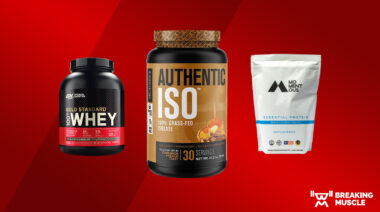People who want to build muscle often turn to the wisdom of bodybuilding. The problem is, professional bodybuilders sometimes consume drugs to attain their physiques, so their advice may not be relevant to the general population. A recent study in the Journal of the International Society of Sports Nutrition examined the sport of natural bodybuilding to see what lessons could be learned.
Maintaining muscle while losing fat to prepare for competition is a nuanced affair, with many opinions on how to do it correctly. Less food, more exercise, and weight training are always a part of the formula. Beyond that, the contest prep process entails specific dietary manipulation practices to achieve the best results.
The problem is, some of these strategies are understudied and can even be dangerous. To fill the knowledge gaps, the researchers in the Journal study performed an analysis of all the existing literature to see where the research provided facts, where the studies agreed, and where there were holes. Here are five trends that can help anyone, not just bodybuilders:
1. Rate of Weight Loss
Because there may be a greater change in lean mass when dieting, especially in individuals who are already nearing single-digit body fat levels, a gradual weight loss is recommended. The authors concluded that a loss of around .5 to 1% of bodyweight per week is a good goal. If a lot of weight needs to be lost, they recommend performing a longer weight loss period, rather than a more intense one over less time.
2. Macronutrient Intake
As far as macronutrients go, the authors recommended a protein intake of 1g-1.4g per pound of bodyweight. The range accounts for varying fat levels, and the researchers noted people with lower body fat might require more protein per pound. Fat intake should fall between fifteen to thirty percent of your total caloric intake. Carbs should make up the rest of your calorie intake.
3. Ketogenic Diets
The researchers also considered ketogenic diets (high-protein, high-fat, very low carb diets), which some bodybuilders employ. They demonstrated some evidence in favor of this practice, but the research is too limited to be certain. They reiterated the importance of carbs, but indicated that with practice, ketogenic diets may be viable for natural bodybuilders as well.
4. Meal Timing
The researchers concluded that total daily protein consumption is the only critical aspect of meal timing to be concerned with. Neither the time of day of protein consumption, nor the combination of protein and carbohydrates seems to be important in building muscle. Nevertheless, they recommended consuming protein soon after a meal when you work out in a fasted state.
The authors warned against eating meals too close together. They also advised against having less than thirty to forty grams of high quality protein per meal, but stated that otherwise, meal frequency makes little difference. As such, fewer meals are better, although they oddly recommended up to six meals per day. The research provided seems to indicate that three or four meals, and perhaps even fewer, seem to be superior.
5. Supplements
As for supplements, beta-alanine, caffeine, and creatine were the only ones proven to be beneficial in the literature. While there may be more good products out there, they need to be demonstrated effective first.
As a sport, natural bodybuilding (the drug-tested kind) is growing in popularity. The lessons learned from developing lean mass without gaining much fat, or from losing fat and improving aesthetically are important to many people, not just competitors. This research provided some valuable insights.
References:
1. Eric Helms, et. al., “Evidence-based recommendations for natural bodybuilding contest preparation: nutrition and supplementation,” Journal of the International Society of Sports Nutrition, 11:20, 2014.
Photo courtesy of Shutterstock.






